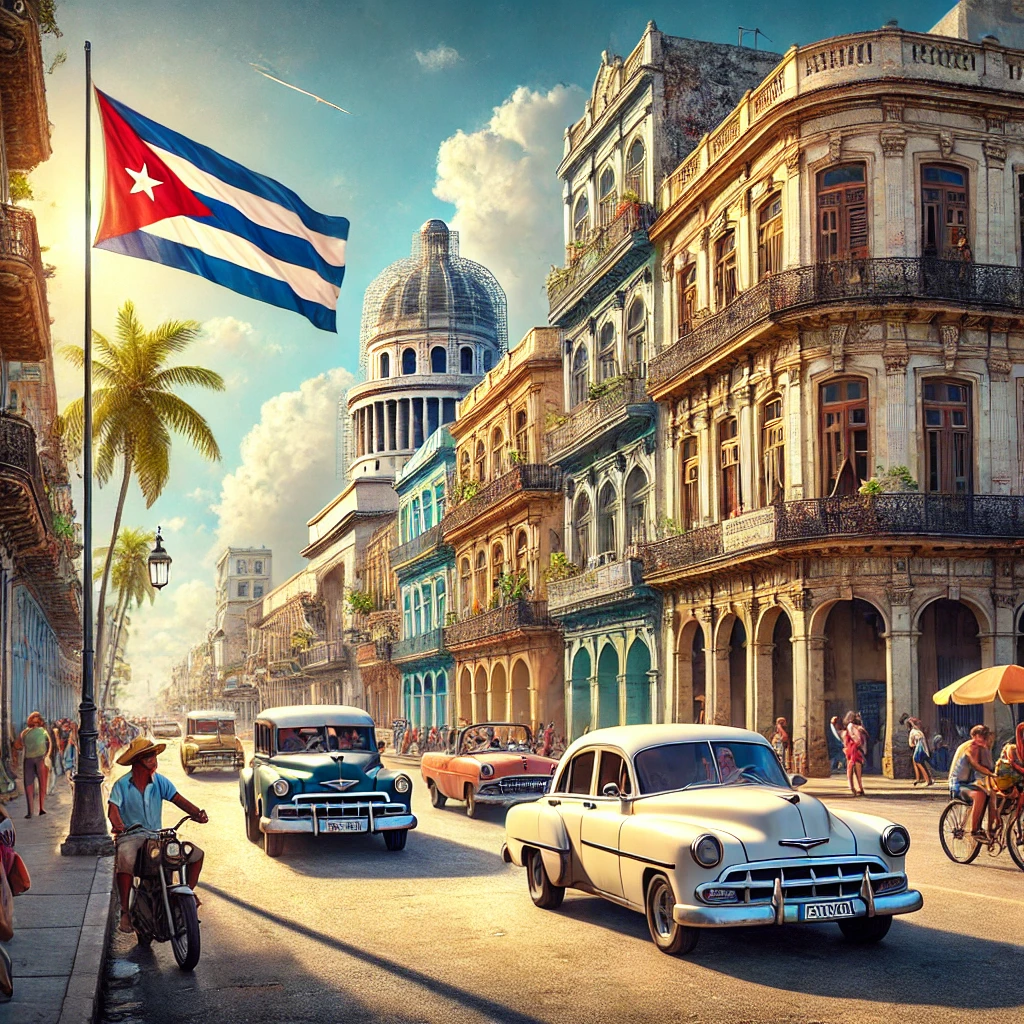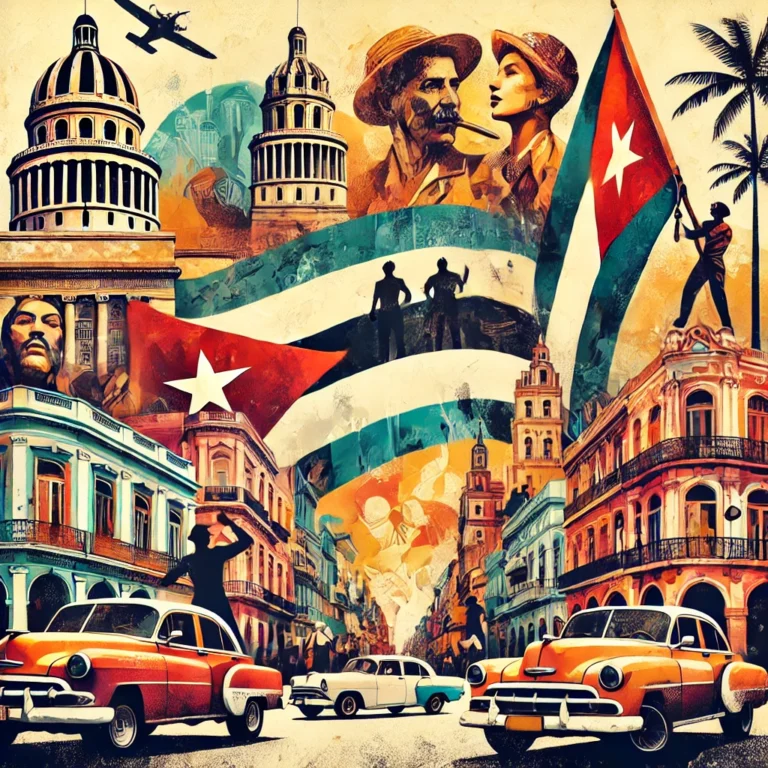From Colony to Revolution and Its Aftermath
With a history marked by colonization, economic exploitation, foreign interventions, and a revolution that changed its destiny, Cuba remains a subject of global debate, admired by some for its resilience and criticized by others for its authoritarianism. This article provides a detailed timeline of Cuba’s history, highlighting the key events that shaped the nation.
Timeline: Cuba’s Key Historical Events
Colonial Era and Independence
- 1492 – Christopher Columbus arrives in Cuba; Spanish colonization formally begins in 1511 under Diego Velázquez de Cuéllar.
- 16th-19th centuries – Cuba becomes a major sugar and tobacco producer, relying heavily on enslaved African labor.
- 1868-1878 – Ten Years’ War (First Cuban War of Independence) against Spain; ends without full independence.
- 1895-1898 – Cuban War of Independence begins; the U.S. intervenes in 1898 during the Spanish-American War.
- 1898 – Spain cedes control of Cuba to the U.S.; Cuba remains under U.S. military occupation.
- 1902 – The Republic of Cuba is officially established; the Platt Amendment allows the U.S. to intervene in Cuban affairs and maintain control over Guantánamo Bay.
The Rise of Fulgencio Batista and U.S. Dominance
- 1933 – Military coup led by Fulgencio Batista ousts President Gerardo Machado.
- 1940-1944 – Batista is elected president in a democratic government.
- 1952 – Batista stages a new coup, establishing an authoritarian, U.S.-backed dictatorship.
- 1950s – Cuba becomes a haven for wealthy Americans, with casinos, prostitution, and mafia control, while the local population faces poverty and inequality.
- 1953 – Attack on the Moncada Barracks, led by Fidel Castro, fails; he is imprisoned and later exiled to Mexico.
The Cuban Revolution
- 1956 – Fidel Castro, Che Guevara, and Raul Castro return to Cuba aboard the Granma, starting a guerrilla movement in Sierra Maestra.
- 1958 – Guerrilla forces, led by Che Guevara, win the Battle of Santa Clara, a decisive victory.
- January 1, 1959 – Fulgencio Batista flees Cuba; Fidel Castro seizes power.
- 1961 – Fidel declares Cuba a socialist state, aligning with the Soviet Union.
- 1961 – Bay of Pigs Invasion: U.S.-trained Cuban exiles fail to overthrow Fidel Castro.
- 1962 – Cuban Missile Crisis: The U.S. and USSR come to the brink of nuclear war after Soviet nuclear missiles are installed in Cuba.
- 1963-1991 – Cuba becomes heavily dependent on Soviet economic and military support.
U.S. Embargo and Economic Crisis
- 1960 – The U.S. imposes an economic embargo, reinforced in 1962, which remains in effect today.
- 1991 – The collapse of the Soviet Union plunges Cuba into an economic crisis, known as the Special Period.
- 2006 – Fidel Castro steps down due to health issues; Raul Castro takes over provisionally.
- 2008 – Raul Castro officially becomes president.
- 2016 – Fidel Castro dies at age 90.
- 2018 – Miguel Díaz-Canel becomes president, marking the first time Cuba is not ruled by a Castro in six decades.
Recent Protests and Political Unrest
- 2021-2024 – Mass protests erupt due to a worsening economic crisis, food shortages, blackouts, and government repression.
Key Highlights of Cuban History
U.S. Influence in Cuba
Since Cuba’s independence in 1902, the U.S. has played a major role in its affairs, with investments in sugar, tobacco, and tourism. The Platt Amendment (1902) allowed direct U.S. intervention in Cuban politics, effectively making it a protectorate until it was repealed in 1934.
Batista’s Dictatorship and Mafia Control
Between 1952 and 1959, Batista’s regime, supported by the U.S., prioritized American business interests, casinos, and mafia operations, while Cuban workers faced extreme poverty. This corruption fueled anti-government resistance and led to the rise of Fidel Castro’s movement.
The Cuban Revolution (1953-1959)
Led by Fidel Castro, Che Guevara, and Raul Castro, the revolution started with the failed Moncada Barracks attack in 1953 but ultimately overthrew Batista after three years of guerrilla warfare. On January 1, 1959, Castro seized control, marking the beginning of socialist Cuba.
Cuba and Socialism
Initially anti-imperialist, the revolution became explicitly socialist in 1961, aligning Cuba with the Soviet Union. This led to tensions with the U.S., including:
- Bay of Pigs Invasion (1961): A failed attempt by U.S.-trained exiles to remove Castro.
- Cuban Missile Crisis (1962): The world came close to nuclear war after the Soviet Union installed nuclear missiles in Cuba.
- U.S. Embargo (1960-present): Economic sanctions that have shaped Cuba’s economic struggles for over six decades.
Post-Soviet Economic Collapse
After the USSR’s collapse in 1991, Cuba entered the Special Period, marked by:
- Severe food shortages
- Economic hardship due to the loss of Soviet subsidies
- Gradual reforms, including limited private businesses and increased tourism
Current Protests and Crisis
Cuba has faced ongoing economic instability, worsened by inflation, food shortages, and power outages. While the government blames U.S. sanctions, protesters demand greater freedoms and political change.

Conclusion
Cuba’s history is a complex narrative of socialism vs. capitalism, imperialism vs. self-determination, and revolution vs. authoritarianism. While the country has achieved notable advances in education and healthcare, it has also faced economic hardship and political repression.
The U.S. embargo remains a key factor in Cuba’s economic difficulties, but internal government policies have also contributed to the crisis. As protests continue, Cuba’s future remains uncertain, but one thing is certain:
Its history is far from over.

